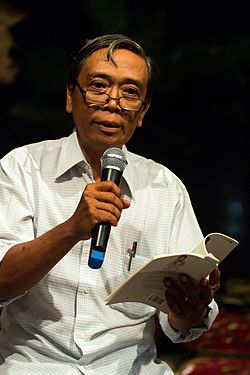Iman Budhi Santosa facts for kids
Quick facts for kids
Iman Budhi Santosa
|
|
|---|---|

Santosa at the launch of his book Sesanti Tedhak Siti in 2015
|
|
| Born | 28 March 1948 Kauman, Magetan, Dutch East Indies
|
| Died | 10 December 2020 (aged 72) Yogyakarta, Indonesia
|
| Nationality | Indonesian |
| Alma mater | Farming Academy, Semarang |
| Occupation | Poet |
| Spouse(s) | Sri Maryati (1971–1978) |
| Children | 4 |
Iman Budhi Santosa (born March 28, 1948 – died December 10, 2020) was a famous Indonesian writer. People often called him IBS. He lived in Yogyakarta, a city in Indonesia.
Even though he studied farming, he loved literature from a young age. In 1969, he helped start a group called Persada Studi Klub. He wrote many books, including poems, novels, and short stories. His poems often showed strong influences from Javanese culture, which is the traditional way of life in Java, Indonesia.
Contents
Early Life and Education
Iman Budhi Santosa was born on March 28, 1948, in Kauman, Magetan, East Java. He was the only child of Iman Sukandar and Hartiyatim.
He finished elementary school in 1960. Later, his mother married Any Asmara, who was also a writer. His family then moved to Yogyakarta. There, he went to a special school for agriculture. He finished his studies in 1968.
His Writing Journey
Starting the Persada Studi Klub
On March 5, 1969, IBS helped create the Persada Studi Klub (PSK). This group was for young writers like Umbu Landu Paranggi. A magazine called Pelopor Yogya supported them. They had a special part in the magazine where young writers could share their work. The group stopped in 1977, but its ideas about freedom stayed with IBS.
His poems were also shaped by Javanese mysticism, called kejawen. This means he used ideas from traditional Javanese culture, like wayang (shadow puppet plays).
Working and Writing
In 1971, IBS started working at a tea plantation. After four years, he worked at a sugar factory for a short time. Then, he joined the Ministry of Agriculture. He worked in different cities like Pekalongan and Cilacap. The ministry later sent him to the Farming Academy in Semarang. He graduated from there in 1983. During these years, he didn't publish much, but he kept writing. His works appeared in books like Tugu (1986).
Returning to Literature
In 1987, IBS left his job at the Ministry of Agriculture. He moved back to Yogyakarta to focus on writing. Soon, he became known as one of the city's most important poets.
In 1994, he won a poetry contest with his poem "Kemenangan Seorang Buruh Harian" (which means "A Day Labourer's Victory"). Two of his long stories, Dorodasih and Pertiwi, also won awards from Femina magazine in 1994 and 1995. In 1996, he published a collection of his poems called Dunia Semata Wayang. This book included poems he wrote from 1969 to 1995.
Later Works and Javanese Wisdom
In 2013, IBS published Ziarah Tanah Jawa (meaning "Pilgrimage to the Land of Java"). This book was a collection of poems he wrote between 2006 and 2012. In the book, he explained that he wanted to use poetry to share Javanese philosophy. He felt that society was starting to forget these old ideas.
A writer named Tia Setiadi reviewed the book. He thought IBS showed a lot about Javanese spiritual beliefs. He also noted that IBS didn't name any specific Javanese thinkers. This might mean that Javanese beliefs came from all Javanese people, not just one person.
In 2015, IBS released Sesanti Tedhak Siti. This book was a collection of geguritan (Javanese poems) he had written since 1980. At the book's launch, he said the title referred to Tedhak Siti. This is a Javanese ceremony when a baby first touches the ground. By using this title, he wanted to suggest that Javanese people should remember and learn about their own culture again.
His Passing
Iman Budhi Santosa had heart problems for several years. He passed away on December 10, 2020, in Yogyakarta, due to heart failure. He was buried at Giri Sapto Cemetery in Imogiri, Bantul.
Family Life
IBS married Sri Maryati in September 1971. They had four children: Wisang Prangwadani, Pawang Surya Kencana, Risang Rahjati Prabowo, and Ratnasari Devi Kundari. They separated in 1978.

